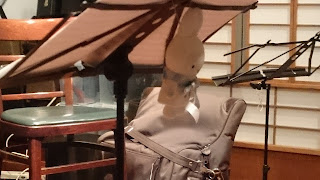(日本語は下です。)
(Just to keep record of a movie I saw this summer.)
The movie,
Trumbo, is about screenwriter Daniel Trumbo who lived through the era of McCarthyism as a Communist sympathyzer. He was convicted of contempt of Congress for not providing information about his or others' involvement in Communist activity, and served time. He could not get work assignment after he came out of the jail, because he was blacklisted, so he supplied scripts under different names. His Oscar winning works included
Roman Holiday.
As a student of American Studies, I had common sense knowledge about McCarthism in Hollywood. I knew such actors like Gregory Peck and Henry Fonda tried to help those who were expelled from the industry, while Ronald Reagan was among those who cooperated with the House Un-American Activity Committee. But I knew little about individual stories at the time, including one about Trumbo, so the movie was very informative and intriguing to me.
The movie centers around Trumbo, but gives close discription of people on both sides--- his family, friends, friends-turned-foes, sympathyzers, etc. It does tend to make you sympathyze with Trumbo, but you can see things were not so simple as he vs. society as villain.
Those who went after Communists and their sympathyzers did so not because they wanted to do harm on them or they were mean, but they were filled with fear that their footing might collapse. They seriously believed that Communism on their own soil would damage democracy and freedom, and out of fear, they tried to eradicate Communists.
It was FDR who said the only thing we have to fear is fear itself.
I truly agree.
Not having lived through the era myself, it's not easy to imagine how much threat the American felt with the developments on the East side of the world. But if you had placed trust in unshakable, eternal being, you would not have felt that much fear to unfairly deprive your fellow countrymen of their rights.
Early in the movie, Trumbo's daughter asks her father if he was a Communist.
He says, Yes. Then she asks if her mother was also a Communist.
He saysm No. Now, she asks if SHE is a Communist.
The father returns a question: if your mother made a good lunch for you, and, when you go to school, there is a friend who didn't bring any lunch. What will you do?
She says, I'll share. He asks, won't you tell him to go work to earn money?
She says, No, I won't do that. He asks, won't you lend him money at a high interest rate?
She says, laughing, Noooo. The father says, well, you are a little Communist.
This is one of my favorite scenes from the movie.
少し前に見た映画について備忘的に。
「
トランボ ハリウッドに最も嫌われた男」は米マッカーシズムの時代を生きた脚本家、
ダニエル・トロンボを中心に、その時代が終わりを告げるまでを描いている。
マッカーシズムについては、ハリウッドの有名俳優たちが排斥される一方、
のちに大統領となるロナルド・レーガンなどは排斥に協力的であった
などの常識的知識はあったものの、詳しいことはあまり知らなかった。
トランボの名も、彼とその仲間が、偽名を使って作品を世に送り出し続けたことも、
アカデミー賞を獲った「ローマの休日」は友人の名を借りて出したものだったことも、
全然知らなかった。
映画では、必ずしもトロンボやブラックリストに載せられた人たちが被害者で、排斥する側、寝返る人が悪者、と言った単純な描き方ではなく、それぞれが、それぞれの立場で、時代を生き延びようと知恵を絞り、悩んでいた様子がよく表されていた。
そのせいか、見終わった時に私の頭に浮かんだのは「怖れ」という言葉だった。
確かにあの時代のアメリカで、共産主義は民主主義の対極であり、国内にその分子が存在することは、自分だちの依って立つ体制が揺るがされると信ずるに十分だったのかもしれない。アメリカをアメリカたらしめている価値観を危機にさらすものは許さない、というところがアメリカ的でもある一方、それを理由に同胞の基本的人権を否定するまでになるというのは、アメリカらしくないとも言える。結局のところ、彼らを突き動かしていたのは、自分の足元が危うくなるという「怖れ」だったのではないか。
近年地元県内では在日韓国朝鮮人を標的にしたヘイトスピーチ、ヘイトデモの問題が深刻になり、ネット上でもナショナリスティックな言葉が頻繁に飛び交っている。
オリンピックの報道では、大会の中では禁止されている国別メダル数ランキングを繰り返し言い立てて「国威発揚」に平和の祭典が利用された。
多重国籍の国会議員に対して、感情的な反応が堂々と披瀝されている。
いまこの国で醸成されている空気の中に、怖れとそれを利用する力とがあることを、改めて想起させられた映画だった。
怖れるべきは怖れそのもの、というFDRの言葉を思い出す。




